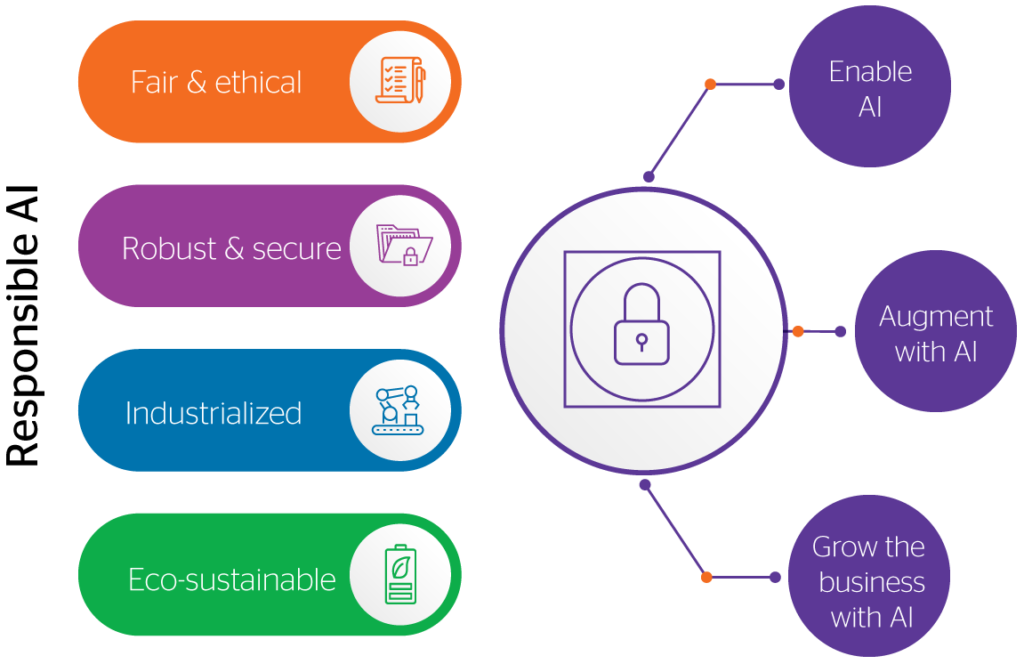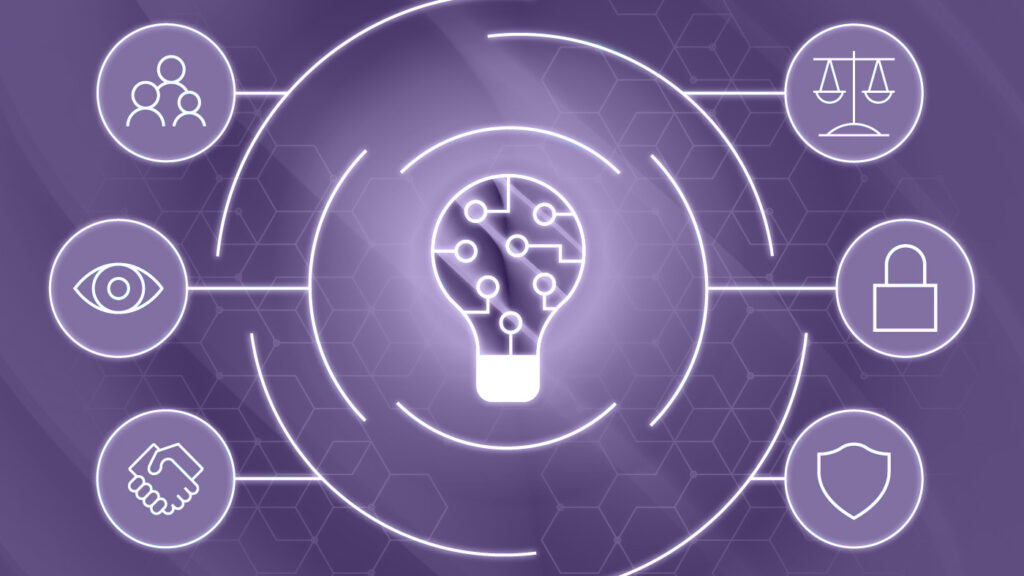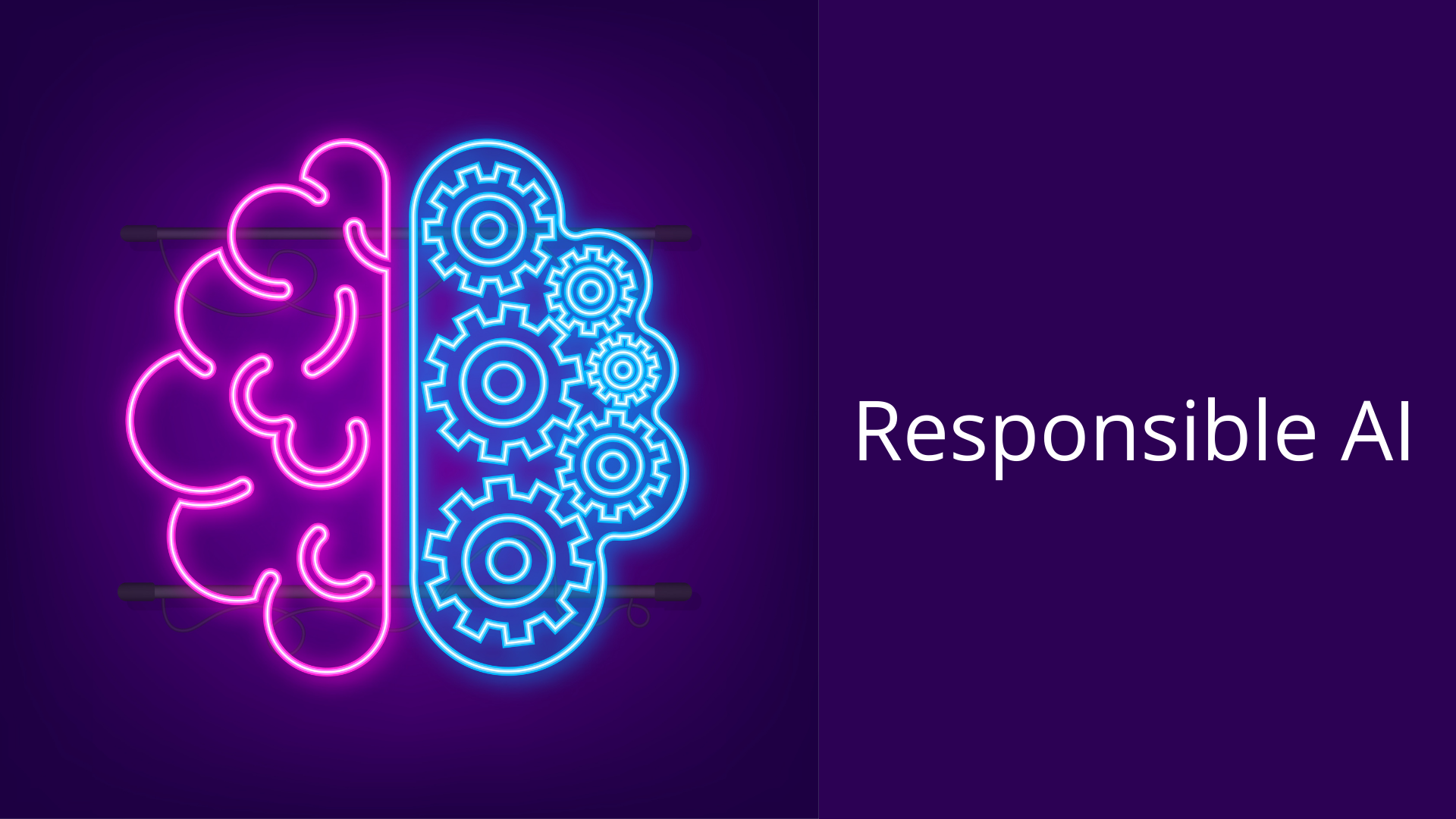Artificial Intelligence (AI) has become an integral part of our modern world, transforming industries and shaping our daily lives in remarkable ways. From virtual assistants and recommendation systems to medical diagnoses and self-driving cars, AI’s influence is undeniable.
However, as AI continues to advance, the concept of “Responsible AI” has emerged as a critical consideration, raising important questions about ethics, accountability, and the potential impact on society.
Understanding Responsible AI
Responsible AI refers to the ethical and thoughtful development and deployment of AI technologies. It encompasses a range of principles and practices aimed at ensuring that AI systems are created and used in ways that are fair, transparent, and beneficial to both individuals and society at large.
The Pillars of Responsible AI

Transparency
Responsible AI demands clear communication about how AI systems make decisions. This transparency builds trust and allows users to understand and verify the processes behind AI-generated outcomes.
Fairness and Bias Mitigation
AI systems must be designed to avoid bias and ensure fair treatment of all individuals, regardless of their background or characteristics. Addressing biases is crucial to prevent AI from perpetuating societal inequalities.
Accountability
Developers and organisations must take responsibility for the actions of AI systems. Clear lines of accountability ensure that decisions made by AI are aligned with human values and legal standards.
Privacy and Data Protection:
Respecting individuals’ privacy rights and safeguarding their data is paramount. Responsible AI involves the ethical collection, usage, and protection of personal information.
Robustness and Safety:
AI systems should be reliable and safe, minimising the risk of errors, malfunctions, or unintended consequences. Ensuring robustness is vital, especially in critical applications like healthcare and autonomous vehicles.
The Benefits of Responsible AI
Responsible AI brings numerous advantages to individuals, businesses, and society as a whole.

Enhanced Trust and Adoption
By adhering to ethical practices, organisations foster trust among users and stakeholders. This trust, in turn, encourages the widespread adoption of AI technologies, leading to their more effective integration into various sectors.
Reduced Bias and Discrimination
Responsible AI actively addresses biases that may be present in data or algorithms. This commitment to fairness helps mitigate discriminatory outcomes and promotes inclusivity.
Improved Decision-Making
AI systems that prioritise transparency and explainability enable better decision-making. Users can understand the reasoning behind AI-generated recommendations and have more confidence in the outcomes.
Societal Benefits
AI used responsibly has the ability to influence societal improvement. In healthcare, for instance, AI-powered diagnostics can lead to early disease detection and personalised treatment plans, ultimately saving lives.
Challenges and Considerations
While the concept of Responsible AI holds great promise, it also presents challenges that require careful consideration.
Balancing Innovation and Ethics
Developers must strike a balance between pushing the boundaries of AI innovation and adhering to ethical guidelines. Straying too far in either direction can lead to unintended consequences.
Data Quality and Bias Mitigation
Responsible AI relies on high-quality, unbiased data. Ensuring data accuracy and mitigating bias demand ongoing effort and vigilance.
Global Standards and Regulations
The absence of uniform global standards and regulations for Responsible AI poses challenges. Harmonising ethical practices across borders is essential to ensure consistent AI governance.
Human-AI Collaboration
As AI systems become more advanced, the question of human-AI collaboration becomes pertinent. Responsible AI should enhance human capabilities rather than replace them.
Responsible AI: Ethical Advancements and Societal Impact
Responsible AI is a pivotal framework that guides the ethical development and deployment of AI technologies. By upholding transparency, fairness, accountability, privacy, and safety, Responsible AI ensures that AI serves the greater good while minimising potential harms. Embracing Responsible AI empowers us to harness the immense potential of AI while safeguarding our values and shaping a future where technology truly enhances human well-being.
FAQs
What is Responsible AI?
Responsible AI refers to the ethical and transparent development and use of AI technologies that prioritise fairness, accountability, and societal benefit.
Why is transparency important in AI?
Transparency in AI ensures that users and stakeholders can understand and verify the decisions made by AI systems, building trust and accountability.
How does Responsible AI address bias?
Responsible AI actively works to identify and mitigate biases in data and algorithms to prevent discriminatory outcomes and promote fairness.
What role does privacy play in Responsible AI?
Privacy is a key consideration in Responsible AI, involving the ethical collection, usage, and protection of personal data used by AI systems.
How does Responsible AI impact innovation?
Responsible AI seeks to balance innovation with ethical considerations, ensuring that AI advances while adhering to guidelines that prioritise societal well-being.


